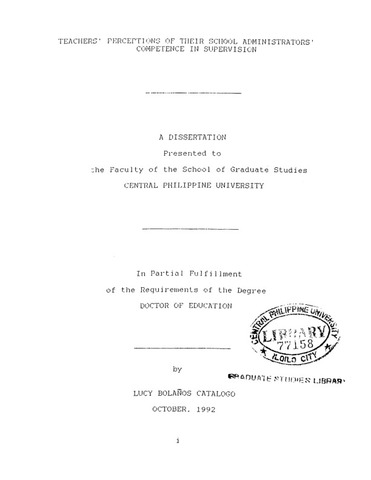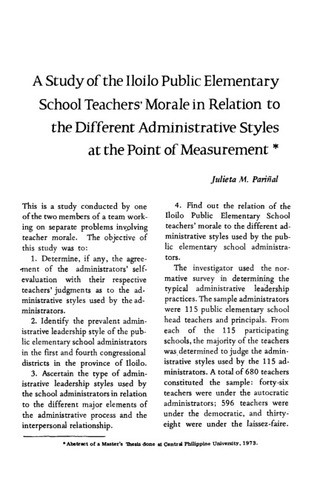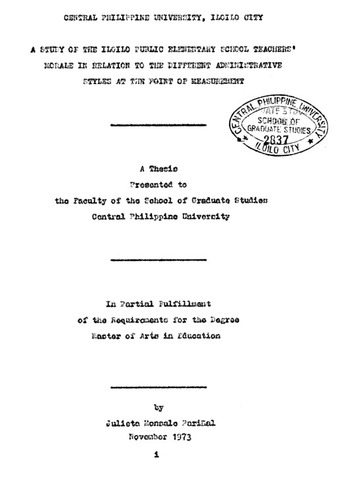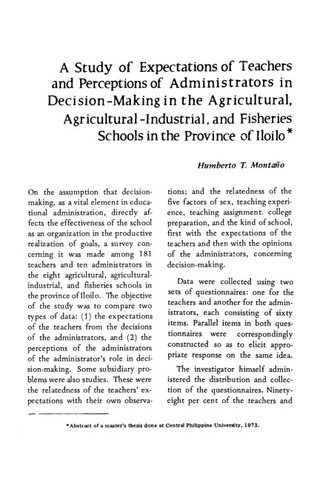Teachers' perception of their school administrators' competence in supervision

Page views
1,148Date
1992Author
Thesis Adviser
Defense Panel Chair
Share
Metadata
Show full item record
Abstract
The quest for quality education is an unending one. All educational efforts have been directed towards the attainment of quality education. It is not only the concern of people in the educational system but also of the parents and other people in all sectors of society who desire quality education for themselves and/or for their children.
The need to improve the quality of education is felt by the educational system of most, if not all countries including the highly developed ones, like the United States. But this need is more pressing in the Philippines. The low achievement scores of elementary pupils is still a nagging issue. The mean percentage of the national test in 1985 which was only 43 percent has not increased as shown by the findings of studies conducted recently. The findings of the Household and School Survey (HSMS) for example showed that the achievement level of elementary pupils across all grades was very low, ranging from 37.8 percent to 43.1 percent. This achievement is far below the proficiency level set as the minimum level of achievement which is 75 per cent.
The Division of Iloilo is not an exception in this problem of poor quality elementary and high school graduates. In fact for the past several years this division was consistently at the bottom in terms of academic achievement of elementary grades pupils when compared with other school divisions in Western Visayas. The results of the National College Entrance Examination (NCEE) every year also revealed very low percentage of qualifiers among the graduates of the secondary schools in the Division of Iloilo. The average percentages of qualifiers in the NCEE for the last five years from 1985 to 1989 was only 29.05 percent, from 1985 to 1989 was only 29.05 per cent.
There are many factors affecting pupil achievement. The quality of teaching and textbook adequacy, more than the other factors of class size, equipment, facilities. etc. affect pupil/student achievement. Thus a massive teacher’s training program and textbook production project were launched. School Administrators likewise were trained to improve their management competencies. Despite all these efforts, no substantial improvement was observed in pupil achievement particularly in this division. The schools were not effective in raising the achievement level of pupils and students.
Continuing research on effective schools has verified the common sense observation that schools are not very effective unless the principal is a good leader. An effective principal according to the findings of Cawelti, among other things is the one who provides active support to teachers. He spends much time observing classes and discussing instructional problems in a manner regarded by teachers as helpful. He knows, what quality instruction requires.
The low level of competence of elementary teachers in our schools is quite alarming. The HSMS survey showed that the overall mean score of teachers in a competency test was only 51 per cent, which is below the acceptable rating for quality instruction. This means that teachers know only one half of what they are expected to know. With the kind of teachers we have, what quality of teaching can we expect from them? Something has to be done to help these teachers, since they are already in our classrooms. According to Rama, our education problem cannot be solved nor educational standard elevated unless we first solve the problem of unqualified teachers.
It is imperative therefore to improve supervision of schools, so that unqualified teachers can be helped. This is a great challenge not only to the Schools Division Superintendent, but to the Division Supervisors. District Supervisors and the school administrators—the principals and head teachers, since supervision must be a cooperative efforts of all those tasked to supervise. Supervision is not a province of a particular person or a particuIar position. School administrators who are directly responsible for the running of the activities of their respective schools are expected to do something to improve instruction. Supervision of instruction is one of the most important activities of the school administrators since instruction is the end that all other activities must serve. In fact all their efforts are towards providing leadership for the improvement of instruction. School administrators who have the competence to supervise their teachers in classroom instruction can be of great help in solving our problem of incompetent teachers in the school system.
To carry out effectively this important task of supervision, the school administrators therefore must possess the necessary skills. Unless these school officials have the supervisory competence, they may not be effective in supervision. Their supervisory competence and leadership are important factors affecting the success in supervision, according to Brandt. But how competent are our school administrators? This is an important question that has to be addressed. It is this question that prompted the researcher to venture in this particular research project with the hope that this piece of work may contribute towards the establishment of baseline data needed for the program of the Division Office of staff development particularly in the development of school administrators and with the hope also that this study may shed light on how instruction can be improved in this particular school division.
The problem
Statement of the Problem
This study attempted to assess the competence of school administrators in supervision of instruction. It tried to answer the following specific questions:
1. How do teachers perceive the competence of their school administrators in the three areas of supervision, motivation, training and evaluation?
2. To what extent do teachers need the competence of their school administrators in the three areas of supervision, motivation, training and evaluation?
3. Is there a gap between the supervisory competence of the school administrators and the teachers’ need for each competence?
4. Do school administrators (principal II, principal I and head teacher) differ in competence in motivation, training and evaluation?
5. In which areas of supervision do teachers under the principals II principals I and head teachers feel the highest need for the competence of their school administrators?
6. Is there a gap between the supervisory competence and the teachers’ need for each competence, when data are analyzed for the group of principals II, for the principals I and for the head teachers separately?
Description
Introduction and statement of the problem
Suggested Citation
Catalogo, L. B. (1992). Teachers' perception of their school administrators' competence in supervision (Unpublished Doctoral dissertation). Central Philippine University, Jaro, Iloilo City.
Type
DissertationSubject(s)
Department
School of Graduate StudiesDegree
Doctor of Education with specialization in Educational AdministrationShelf Location
GSL Theses 378.242 C28t
Physical Description
254 leaves
Related items
Showing items related by title, author, creator and subject.
-
A study of the Iloilo public elementary school teachers’ morale in relation to the different administrative styles at the point of measurement
Pariñal, Julieta Monsale (Central Philippine University, 1974)This is a study conducted by one of the two members of a team working on separate problems involving teacher morale. The objective of this study was to: 1. Determine, if any, the agreement of the administrators’ ... -
A study of the Iloilo public elementary school teachers' morale in relation to the different administrative styles at the point of measurement
Pariñal, Julieta Monsale (1973)This is a study conducted by one of the two members of the team working on the separate problems on the teacher morale. The objective of this study was to: 1. Determine, if any, the agreement of the administrators' ... -
A study of expectations of teachers and perceptions of administrators in decision-making in the agricultural, agricultural-industrial, and fisheries schools in the Province of Iloilo
Montaño, Humberto T. (Central Philippine University, 1974)In the assumption that decision-making, as a vital element in educational administration, directly affects the effectiveness of the school as an organization in the productive realization of goals, a survey concerning it ...




